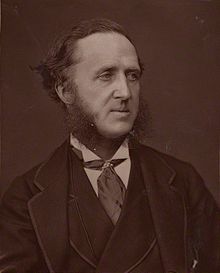Dudley Ryder, 3rd Earl of Harrowby
The Earl of Harrowby | |
|---|---|
 | |
| President of the Board of Trade | |
| In office 4 April 1878 – 21 April 1880 | |
| Monarch | Victoria |
| Prime Minister | The Earl of Beaconsfield |
| Preceded by | Sir Charles Adderley |
| Succeeded by | Joseph Chamberlain |
| Personal details | |
| Born | 16 January 1831 Brighton, England |
| Died | 26 March 1900 (aged 69) Sandon Hall, Staffordshire, England |
| Political party | Conservative |
| Spouse |
Lady Mary Cecil (m. 1861) |
| Parent(s) | Dudley Ryder, 2nd Earl of Harrowby Lady Frances Stuart |
| Alma mater | Christ Church, Oxford |
Dudley Francis Stuart Ryder, 3rd Earl of Harrowby PC JP DL (16 January 1831 – 26 March 1900), known as Viscount Sandon from 1847 to 1882, was a British peer and politician.
Life
[edit]He was the second son and eventual heir of Dudley Ryder, 2nd Earl of Harrowby, and Lady Frances Stuart, fourth daughter of John Stuart, 1st Marquess of Bute. He was born at Brighton on 16 January 1831. He was educated at Harrow and the university of Oxford, where he matriculated from Christ Church on 31 May 1849, graduated B.A. in 1853, and proceeded M.A. in 1878.[1]
On leaving the university, Viscount Sandon, as he was styled during his father's lifetime, made a tour in the East with Henry Herbert, 4th Earl of Carnarvon, visiting Syria and the Lebanon (see Carnavon's Recollections of the Druses of the Lebanon, London, 1860, 8vo). On his return to England, he did garrison duty as captain in the 2nd Staffordshire militia regiment, during the Crimean War and Indian mutiny.[1]
Political career
[edit]
Harrowby was Member of Parliament (MP) for Lichfield from 1856 to 1859 and for Liverpool from 1868 until he succeeded to the peerage in 1882. He gained experience of affairs as private secretary to Henry Labouchere at the colonial office.[1]
He was a member of the select committees on the Hudson's Bay Company (1857) and the Euphrates Valley (1871–72), and continued throughout life to devote much time and attention to the study of imperial and colonial questions.[1] He was Vice-President of the Committee on Education from 1874 to 1878, and President of the Board of Trade (with a seat in the cabinet) from 1878 to 1880 in Benjamin Disraeli's second administration and was sworn of the Privy Council in 1874. Between 1885 and 1886, he served as Lord Privy Seal in Lord Salisbury's first government.[1]
Apart from his career in national politics he was also Chairman of the Staffordshire county council and a Deputy Lieutenant and Justice of the Peace for that county.
He died at Sandon Hall, Staffordshire, on 26 March 1900.[1]
Family
[edit]Lord Harrowby married Lady Mary Cecil, daughter of Brownlow Cecil, 2nd Marquess of Exeter, in 1861. The marriage was childless. Harrowby died in March 1900, aged 69, and was succeeded by his younger brother, Henry. Lady Harrowby died in July 1917.
References
[edit] This article incorporates text from a publication now in the public domain: Rigg, James McMullen (1901). "Ryder, Dudley Francis Stuart". In Lee, Sidney (ed.). Dictionary of National Biography (1st supplement). London: Smith, Elder & Co.
This article incorporates text from a publication now in the public domain: Rigg, James McMullen (1901). "Ryder, Dudley Francis Stuart". In Lee, Sidney (ed.). Dictionary of National Biography (1st supplement). London: Smith, Elder & Co.
External links
[edit]- 1831 births
- 1900 deaths
- Lords Privy Seal
- People educated at Harrow School
- Alumni of Christ Church, Oxford
- Members of the Privy Council of the United Kingdom
- Earls of Harrowby
- English justices of the peace
- Members of the Parliament of the United Kingdom for Liverpool
- UK MPs 1852–1857
- UK MPs 1857–1859
- UK MPs 1868–1874
- UK MPs 1874–1880
- UK MPs 1880–1885
- UK MPs who inherited peerages
- Members of the London School Board
- Ryder family
- Deputy lieutenants of Staffordshire
- Presidents of the Board of Trade


